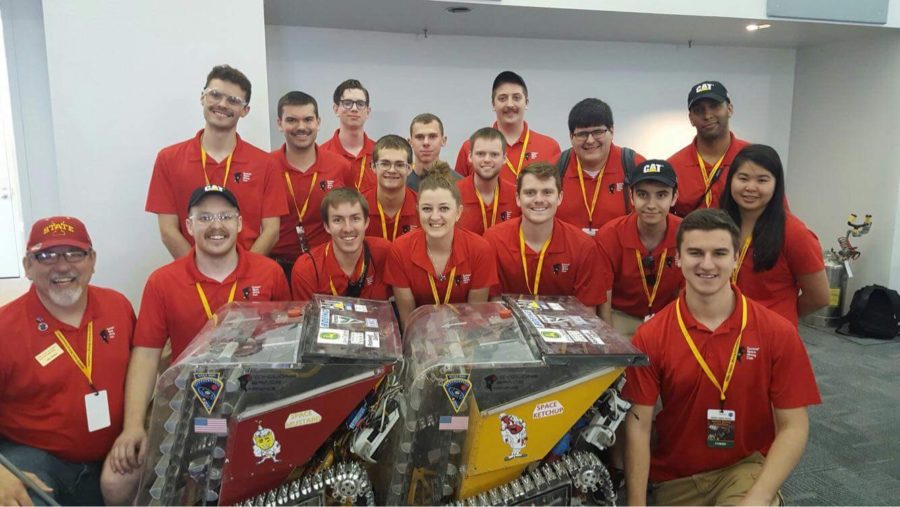To ISU and Beyond: Cyclone Space Mining Provides Opportunities in STEM
February 5, 2018
For STEM students with visions of faraway industry, space isn’t the final frontier.
Cyclone Space Mining, an organization that develops mining robots for NASA’s Space Mining Competition, provides experience in the designing, testing and manufacturing of new technology for use both at home and, someday, in the cosmos.
However, the organization doesn’t just benefit students at Iowa State and it isn’t all about far off planets; the real mission is spreading education in the sciences to Iowa and beyond.
Cyclone Space Mining is a STEM based organization operating out of Hoover Hall with the principal aim of designing, building and programming real-to-life models of mining devices for use in the NASA Space Mining Competition. Students collaborate in various branches of development to build an efficient mining robot for operations on Mars.
Universities around the world participate in the event, where teams must develop mining robots that can perform the tasks necessary for real world applications, should humankind ever turn to Mars for raw materials. The bot must fit the weight and performance requirements needed to be transported, used and retrieved by NASA, and will be put to the test at the Kennedy Space Center in May.
Although the models are only tested in a simulated Mars environment, the machines are designed to handle organic material similar to regolith, the gravelly soil composition found on the red planet.
The project is made up of students from a wide range of STEM majors, as well as software and computer science majors. Students are responsible for different aspects of the design and programming of the machine, as well as all public relations for the project. Everyone is required to set the guidelines for their operating system and submit structured reports to NASA to show that the design will meet the regulations of the competition. For students, these reports are exposure to the real life of a contracted engineer.
Will Nickoloff, one of the current mechanical project directors and a junior in mechanical engineering, says the experience is a great immersion into government contracting work. Engineers doing work for organizations like NASA or the federal government are all required to undergo a similar process to the report-writing and standard setting done in the club meetings, and students get direct feedback from NASA itself on their reports.
Nickoloff has been involved in Cyclone Space Mining for three years. After working closely with a previous project director in his second year, he has now become a director himself. He says that the exposure to the development process has been the most valuable experience for him, as well as learning about and testing new types of mechanical processes and systems he hadn’t encountered before. He says the experience has prepared him well for a career in engineering, whether it’s with the space program or other fields of engineering.
“It’s the first thing I bring up on my resume,” said Friesen. Friesen said for all contributing members of the project, the NASA Space Mining Competition is usually the thing they are most proud of from their time at Iowa State.
Given current developments by SpaceX and a budget increase signed by President Trump last year, Friesen says he’s hopeful that real mining operations will be implemented off-world in the near future. He says that some of the students involved in the program have gone on to work for NASA or are interested in someday pioneering these new projects and leading humanity’s march into the final frontier. Private startups like Planetary Resources have already begun hashing out the systems and practices of a private space-mining industry, and similar companies may soon become employers for a large number of STEM majors.
Aside from the research and development process for the Space Mining Competition, Cyclone Space Mining also participates in several events over the year that bring the possibilities of a STEM education to children. The club is working on a project to teach children across all 99 counties of Iowa about the science behind programming, engineering and space.
The program doesn’t stop at the state line though- this year, the club plans to bring their resources to Arizona, to a school with high rates of poverty and few opportunities to learn about the sciences and STEM. The club has already sent a shipment of “bee bots”, small animatronics that simulate a simplified demonstration of programming, to the school, and have been Skyping in regularly to teach lessons on various areas of knowledge relating to their work in STEM to inspire children to chase an interest in the sciences.
The Arizona school will be allowed to keep the materials given to them by the club to continue to teach the program throughout the years. The club is also working out a plan to bring Iowa State faculty and former astronaut Clayton Anderson in for a Skype call, phoning in to get kids excited about the prospects of space exploration.
Cyclone Space Mining is sponsored by engineering companies such as John Deere, Boeing, Almaco, Arconic, Caterpillar and Vermeer, as well as the Iowa Space Grant Consortium. Once the deadline is reached for all design and assembly of the robot, a group of members will represent the Iowa State Foundation in the competition at the Kennedy Space Center. The competition will take place May 14-18.







